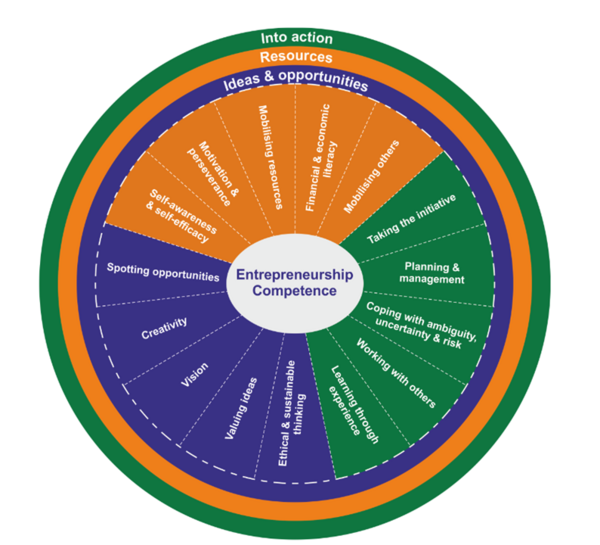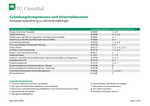Events #1: Startup Skills
What skills do founders and other people who want to realise entrepreneurial ideas need? This question is on the minds of the TU Clausthal startup service team, as well as researchers and teachers worldwide, and there are many, sometimes very different, answers to it.
The EntreComp's startup and entrepreneurship competences.
One of the answers comes from the Joint Research Centre, the European Commission's in-house science service. In a research project from November 2014 to March 2016, its researchers reviewed the existing literature on startup and entrepreneurship competences, examined 42 different initiatives in which they are defined, taught or assessed, and conducted interviews with experts in the field. They then published the results of their work in 2016 with the publication of EntreComp, the Entrepreneurship Competence Framework. According to this framework, entrepreneurs need 15 different competencies, including creativity, the ability to identify value creation opportunities, and a certain basic understanding of finance and economics.
The startup and entrepreneurship competences of the TU Clausthal
However, since the EntreComp competencies overlap in parts, the team of the TU Clausthal's startup service has condensed and slightly adapted the EntreComp competency model. The result is a model with the following nine competencies:
Identifying opportunities and developing ideas: Identify value creation opportunities through problem analysis, market analysis or the recognition of new contexts. Develop creative ideas for exploiting value-creation opportunities, recognizing and protecting their value, and developing a vision for them.
Reflect and develop one's own personality: Identifying one's own needs and desires, knowing and improving one's strengths and weaknesses, as well as those of one's team. It is also the competence to be able to maintain one's own motivation as well as that of one's team despite pressure or adverse circumstances.
Mobilize resources and support and use them responsibly: Being able to procure resources and support needed to realize one's ideas and use or deploy them responsibly.
Economic Understanding: Understand and make sense of economic concepts, terms, ratios and methods relevant to the implementation of own ideas.
Management Skills: Be able to implement own value-adding activities in a planned manner and using appropriate methods.
Managing uncertainties and risks: Be able to assess and reduce risks and uncertainties for the implementation of own ideas.
Cooperating with others: Being able to establish contacts with others, develop and implement ideas together with them and manage and resolve conflicts.
Learning from experience: being able to reflect on one's own and others' experiences in order to identify successful methods and approaches and integrate them into current processes or avoid repeating mistakes.
Being able to develop products: Be able to identify product, service, or process requirements, develop tests and prototypes, and use feedback to incrementally optimize products, services, or processes.
With the help of this model, the team of the startup service has identified courses at the TU Clausthal that will teach you competencies for starting your own business. You can find many of them now in the course catalogue under the heading "Startup Skills and Entrepreneurship". In the module manuals and regulations of your study programmes you will find out whether you can have the attendance of the courses credited to your studies. If you want to know more about which courses teach you which competencies, just have a look at the following PDF document.


